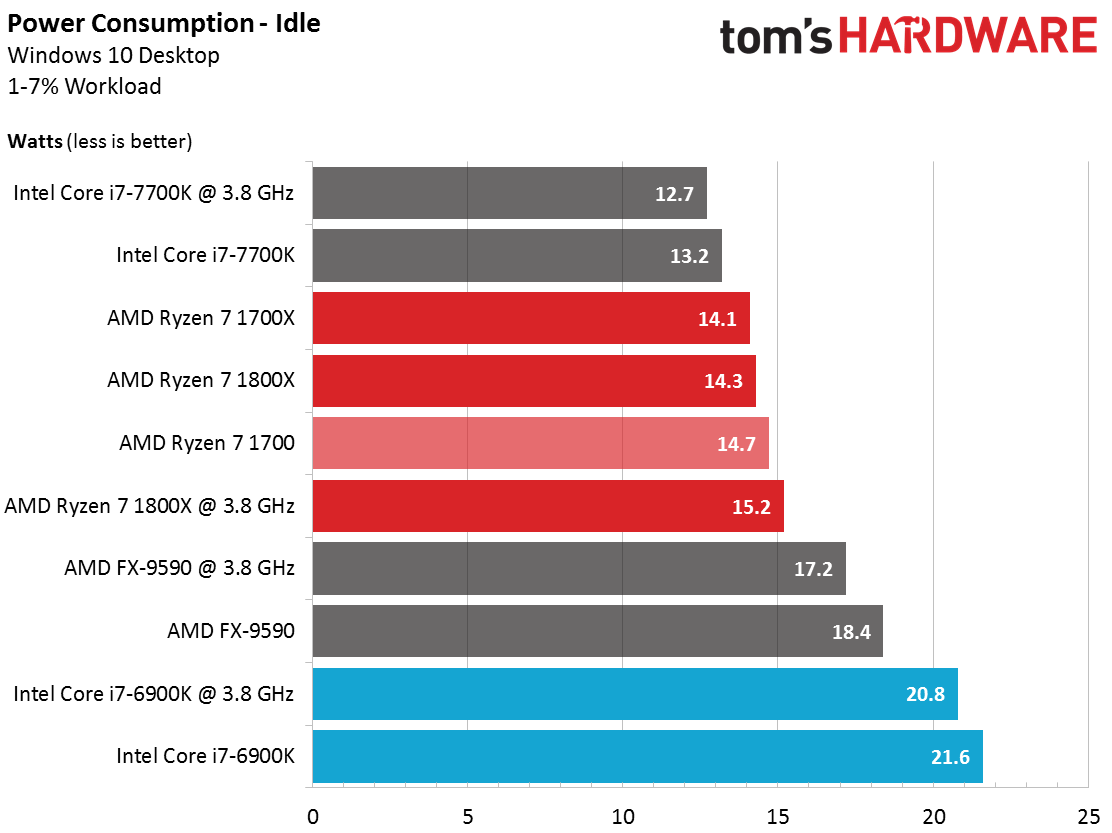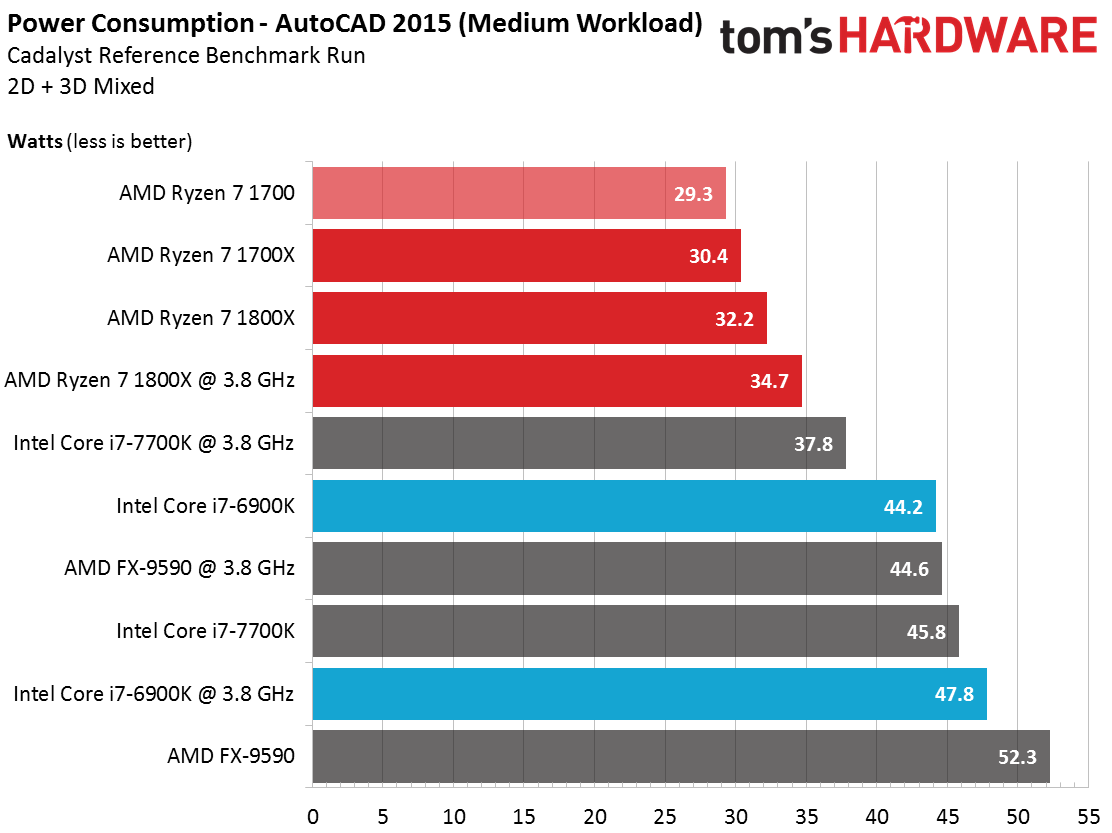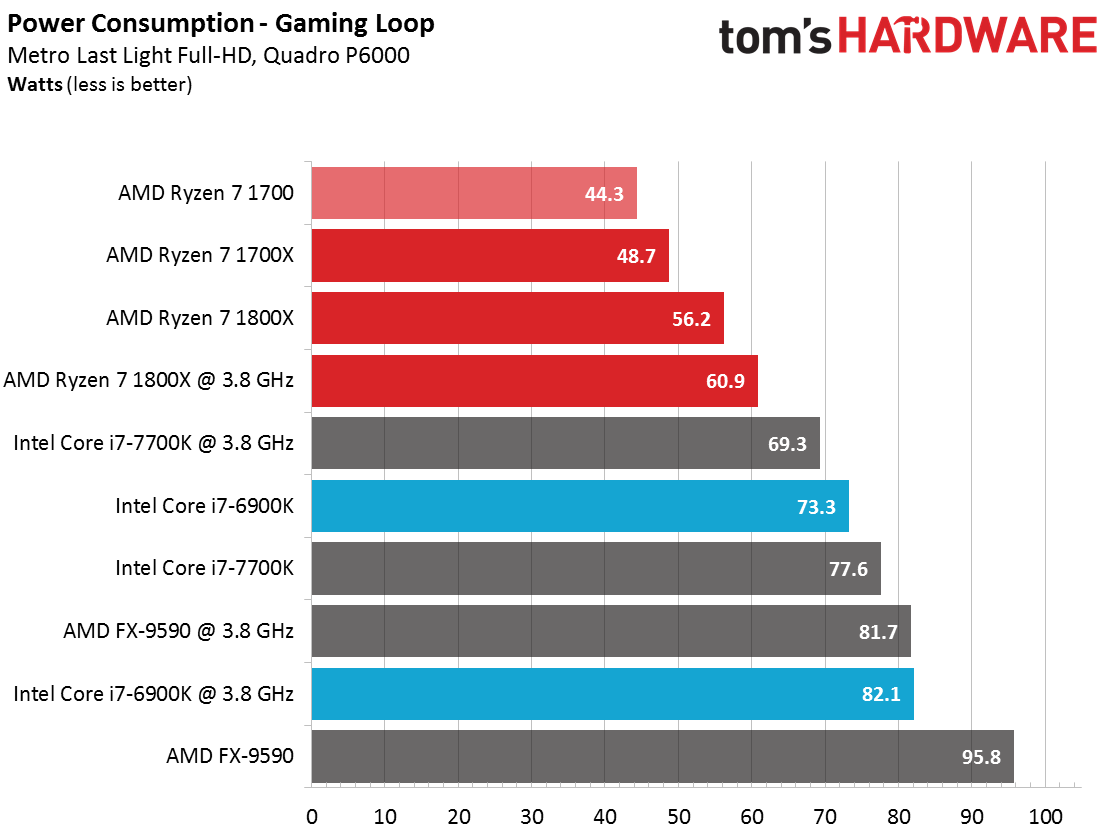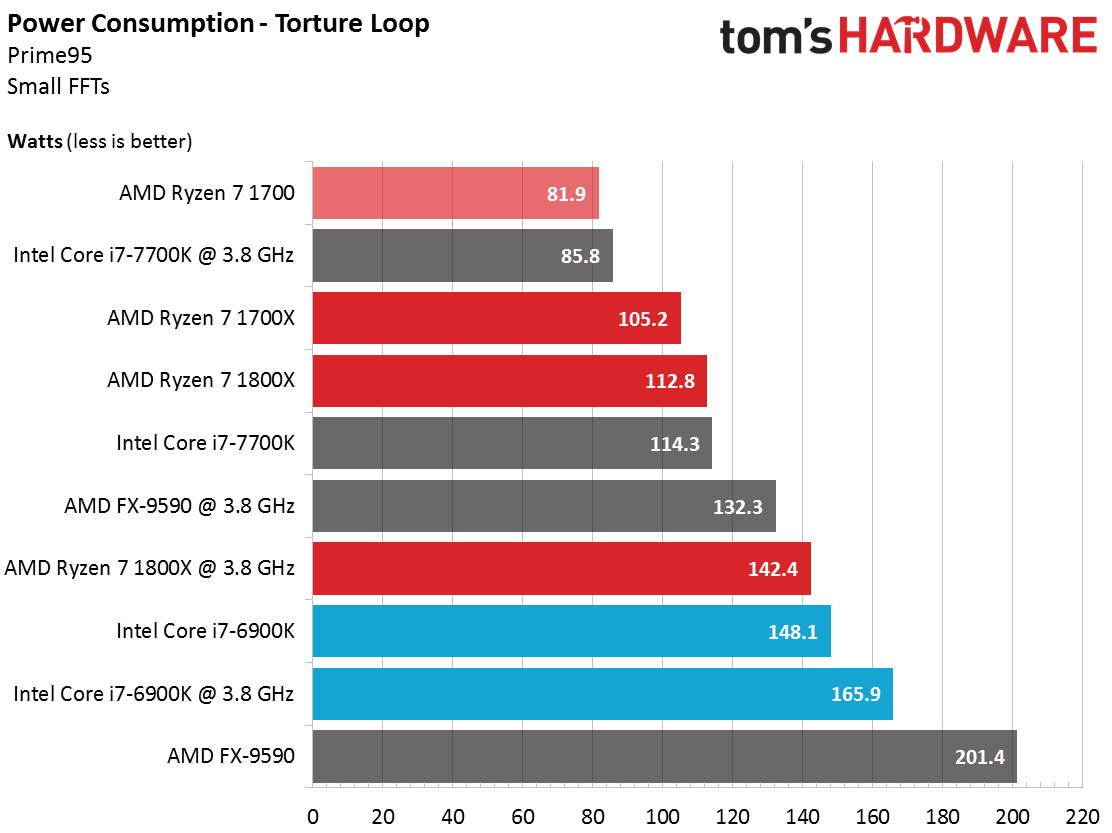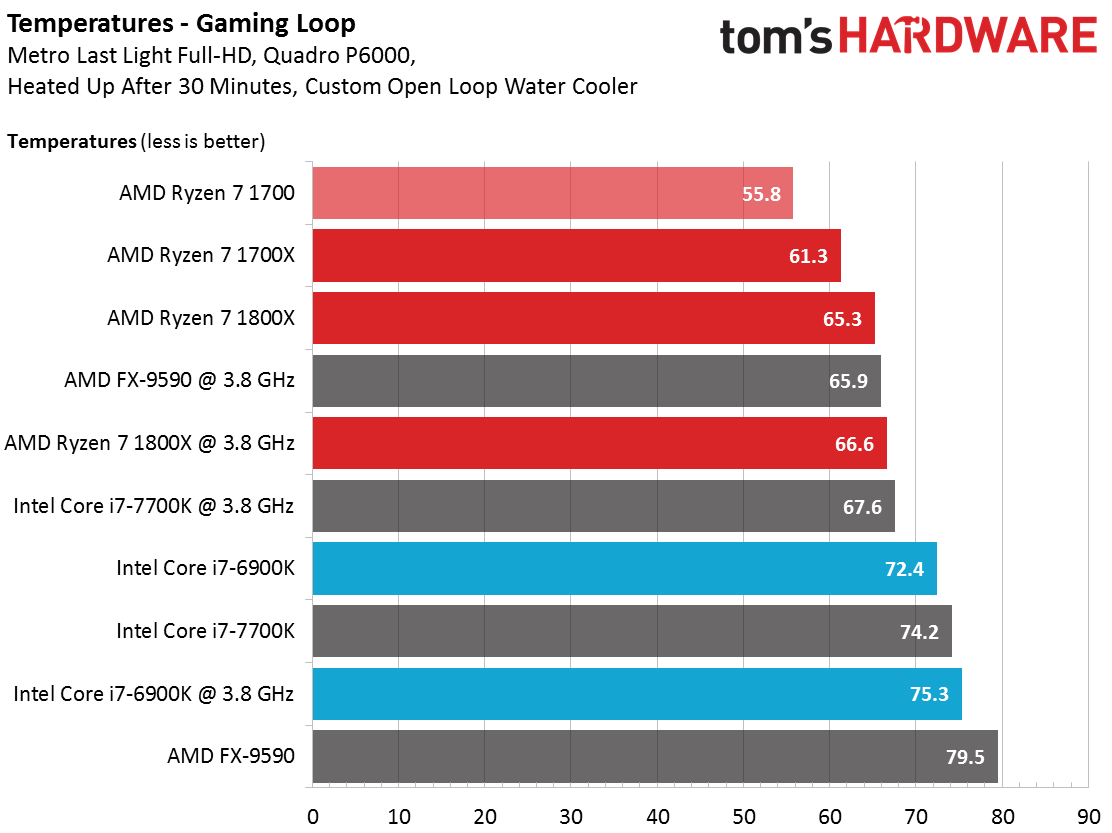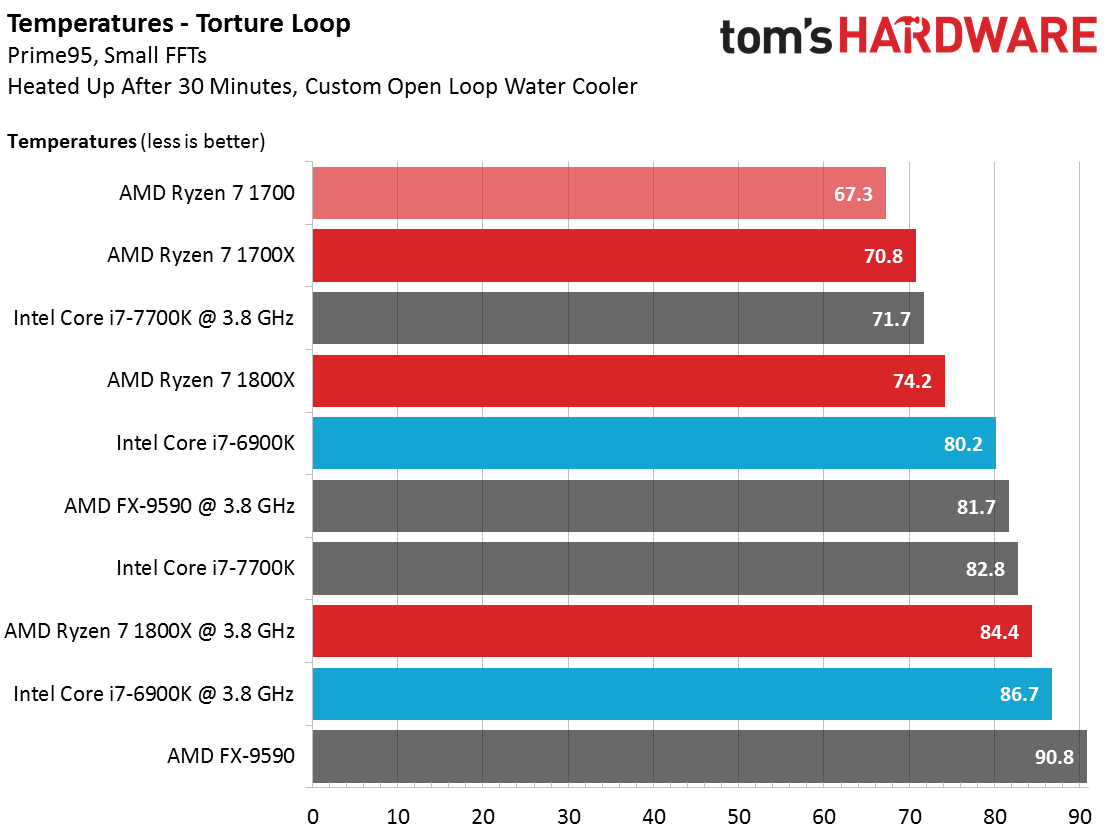AMD Ryzen 7 1700 CPU Review
Why you can trust Tom's Hardware
Power Consumption & Temperatures
Direct Comparisons of Power Consumption
The 65W 1700 consumes slightly more power at idle than the 95W Ryzens.
Meanwhile, our mildly overclocked Core i7-6900K consumes more power at idle than its stock configuration because we reduced its single-core Turbo Boost frequency to achieve a 3.9 GHz clock rate.
The 1700's power consumption is impressive during the AutoCAD 2015 workload; it only consumes 29.3W. A stock Core i7-7700K uses considerably more power. But looking at these figures on their own can be misleading. Remember that Intel's top Kaby Lake-based CPU demonstrated a commanding lead in the previous page's AutoCAD workloads, so it ends up offering superior performance per watt.
AMD's Ryzen 7 1700 proves its frugal nature by drawing only 44.3W during our gaming benchmark. The -6900K consumes less power than Intel's Core i7-7700K, likely because the workload doesn't fully utilize all eight cores.
The 32nm FX-9590 is in a class of its own, which isn't a good thing. Still, it highlights one of the 14nm process' main advantages.
Prime95's Small FFT stress test pushes power consumption to the max, revealing one of the 65W 1700's best attributes: it consumes 23.3W less than the 1700X. The 1700's modest power use, coupled with a small performance delta between it and the 1700X in our application benchmarks, paints a convincing picture of efficiency.
Temperatures
We optimized our CPU cooler for Socket AM4 by using two nuts between the spring and bracket to increase the force on the package to 0.4Nm. That is why these results differ from those in our launch article, where we only used washers.
Get Tom's Hardware's best news and in-depth reviews, straight to your inbox.
Both AMD and Intel employ different temperature measurement methodology. While these readings aren't entirely comparable, they do serve as a close approximation.
In its stock form, Ryzen 7 1700 runs cooler than the rest of the field due to its lower TDP. Of course, all bets are off once you start overclocking and dialing in higher voltages. In any case, AMD uses solder between its die and heat spreader, which generally provides better thermal transfer than thermal paste. Intel famously uses thermal paste and contends that it boosts processor longevity.
Even though our results aren't apples-to-apples, it's clear that the 1700's 65W TDP does convey an expected power and thermal advantage over the other Ryzen 7s.
Current page: Power Consumption & Temperatures
Prev Page Workstation & HPC Benchmarks Next Page Conclusion
Paul Alcorn is the Editor-in-Chief for Tom's Hardware US. He also writes news and reviews on CPUs, storage, and enterprise hardware.
-
mitch074 And how about testing with some AMD GPU? Seems Ryzen gets the short hand of the stick when using an Nvidia GPU... https://forums.overclockers.co.uk/threads/nvidia-dx12-driver-holding-back-ryzen.18774744/Reply -
envy14tpe Why no 1440p or 4k gaming? Who buys 1700 for 1080p gaming? In gaming, the new 1700, 1700x, 1800 don't compare to 7700k in gaming. But i don't see that like all other testing methodologies done by likes of gamernexus and what not.Reply
EDIT. Based on the downvoting of this comment it seems AMD lovers are a little butt hurt. -
ykki Thanks for the review. Will Tom's bench (or has already benched) the R5s with AMD GPUs? (i5 + 1060, i5 + 480, R5 + 1060, r5 + 480)?Reply -
Paul Alcorn Reply19526350 said:Why no 1440p or 4k gaming? Who buys 1700 for 1080p gaming? In gaming, the new 1700, 1700x, 1800 don't compare to 7700k in gaming. But i don't see that like all other testing methodologies done by likes of gamernexus and what not.
Here is some recent testing at 1440p. It includes the 1700, as well.
http://www.tomshardware.com/reviews/amd-ryzen-vs-intel-kaby-lake-gaming,4977.html
-
envy14tpe Reply19526465 said:19526350 said:Why no 1440p or 4k gaming? Who buys 1700 for 1080p gaming? In gaming, the new 1700, 1700x, 1800 don't compare to 7700k in gaming. But i don't see that like all other testing methodologies done by likes of gamernexus and what not.
Here is some recent testing at 1440p. It includes the 1700, as well.
http://www.tomshardware.com/reviews/amd-ryzen-vs-intel-kaby-lake-gaming,4977.html
That shows the new AMD cpus as is. From all I see the i7-7700k blasts the new AMD 1700, 1700x, 1800x series at 1440p +. That's important to keep in mind for gamers that want the most out of a CPU n high end GPU. -
ddpruitt Replyeven if Ryzen isn't shaping up to be universally superior, as many hoped prior to launch.
This makes it difficult to universally recommend those high-end parts.
Why do they have to be universally superior? They do a killer job on highly threaded workloads and are a lot cheaper than equivalent Intel. Sure gamings a wash but they're all playable. Aiming for universally superior is shooting for the moon and doesn't happen even with a single Intel chip.
But looking at these figures on their own can be misleading. Remember that Intel's top Kaby Lake-based CPU demonstrated a commanding lead in the previous page's AutoCAD workloads, so it ends up offering superior performance per watt.
Any chance you can multiply the numbers out so we can compare the differences? -
TJ Hooker So I have to ask, is there any reason to buy a 1700X/1800X over a 1700 if you're comfortable with overclocking?Reply -
Ian_85 Can you please repeat this test after each of the Ryzen bios updates in April and May?Reply
I think people would be interested to show just how much performance in a new CPU architecture improves in the months after its initial release. -
elbert Reply
I dont believe that has Ashes of the Singularity updated tests. Good review and I would like to see more. Now that all the Ryzen's have been benchmarked on 1080p maybe 1440p and 4k would make a good review. With and without SLI/crossfire also just to see how it works for Ryzen. Possibly Gskills could pitch in some of their Flare X 3466 RAM for Ryzen.19526465 said:19526350 said:Why no 1440p or 4k gaming? Who buys 1700 for 1080p gaming? In gaming, the new 1700, 1700x, 1800 don't compare to 7700k in gaming. But i don't see that like all other testing methodologies done by likes of gamernexus and what not.
Here is some recent testing at 1440p. It includes the 1700, as well.
http://www.tomshardware.com/reviews/amd-ryzen-vs-intel-kaby-lake-gaming,4977.html
